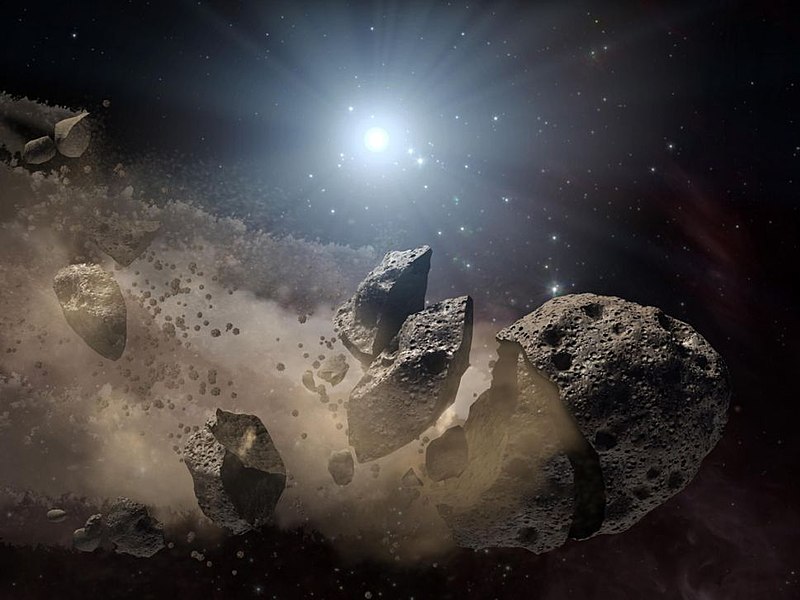This year, our planet has had a number of close encounters with asteroids. Now, a 361-foot asteroid is said to pass by Earth on Wednesday, according to NASA.
NASA’s Center for Near-Earth Object Studies has identified the 361-foot asteroid as 2019 UK6. At the moment, the said asteroid is also moving towards the Earth at a speed of 17,000 miles per hour. As mentioned, 2019 UK6 is measured at around 361-feet in diameter, which means it is bigger than the Statue of Liberty in the United States and Big Ben in London.
The CNEOS officially classified 2019 UK6 as an Amor-type asteroid. Amor asteroids do not follow an Earth-crossing orbit compared to other asteroid types like the Apollos and Atens. Instead, Amor asteroids move around a wide orbit around the Earth and the sun.
However, due to their tendencies of passing by the Earth at a dangerously close range, 2019 UK6 is labeled as a near-earth object. Therefore, 2019 UK6 can still pose a potential threat to the planet, which is why NASA keeps a close eye on this asteroid every day.
As to when 2019 UK6 is said to pass by Earth, NASA says that the asteroid will pass by Earth on the 20th of November, 2019, at 1:20 a.m. EST. Fortunately, even if the asteroid does make its approach, it will only come as close as 0.03952 astronomical units or about 3, 800, 000 miles away from the Earth.
Similarly, back in August of this year, News Nation reported that an asteroid with the exact same measurements as 2019 UK6, called 2016 PD1, was said to pass by the Earth as well. Compared to 2019 UK6, 2016 PD1 moved at a rate of 13,000 miles per hour. 2016 PD1 was reported to pass by Earth on the 26th of August, 0.02925 astronomical units away, or 2, 700,000 miles away.
2019 UK6 and 2016 PD1 are just two of the many asteroids that are known to approach or have approached Earth this year. Other asteroids that have previously approached the planet include 2019 OK, 2019 OD, 2019 OE, 2019 NN3, 2019 MB4, 2019 MT2, 2016 NO56M, 2015 HM10, 2006 QV89, and RF12.



 NASA and SpaceX Target Crew-11 Undocking From ISS Amid Medical Concern
NASA and SpaceX Target Crew-11 Undocking From ISS Amid Medical Concern  SpaceX Prioritizes Moon Mission Before Mars as Starship Development Accelerates
SpaceX Prioritizes Moon Mission Before Mars as Starship Development Accelerates  SpaceX’s Starship Completes 11th Test Flight, Paving Way for Moon and Mars Missions
SpaceX’s Starship Completes 11th Test Flight, Paving Way for Moon and Mars Missions  Neuralink Plans High-Volume Brain Implant Production and Fully Automated Surgery by 2026
Neuralink Plans High-Volume Brain Implant Production and Fully Automated Surgery by 2026  FDA Lifts REMS Requirement for CAR-T Cell Cancer Therapies
FDA Lifts REMS Requirement for CAR-T Cell Cancer Therapies  Cogent Biosciences Soars 120% on Breakthrough Phase 3 Results for Bezuclastinib in GIST Treatment
Cogent Biosciences Soars 120% on Breakthrough Phase 3 Results for Bezuclastinib in GIST Treatment  Eli Lilly’s Inluriyo Gains FDA Approval for Advanced Breast Cancer Treatment
Eli Lilly’s Inluriyo Gains FDA Approval for Advanced Breast Cancer Treatment  CDC Vaccine Review Sparks Controversy Over Thimerosal Study Citation
CDC Vaccine Review Sparks Controversy Over Thimerosal Study Citation  Trump and Merck KGaA Partner to Slash IVF Drug Costs and Expand Fertility Coverage
Trump and Merck KGaA Partner to Slash IVF Drug Costs and Expand Fertility Coverage  Trump Signs Executive Order to Boost AI Research in Childhood Cancer
Trump Signs Executive Order to Boost AI Research in Childhood Cancer  Lost in space: MethaneSat failed just as NZ was to take over mission control – here’s what we need to know now
Lost in space: MethaneSat failed just as NZ was to take over mission control – here’s what we need to know now  Tabletop particle accelerator could transform medicine and materials science
Tabletop particle accelerator could transform medicine and materials science  NASA Astronauts Wilmore and Williams Recover After Boeing Starliner Delay
NASA Astronauts Wilmore and Williams Recover After Boeing Starliner Delay  Is space worth the cost? Accounting experts say its value can’t be found in spreadsheets
Is space worth the cost? Accounting experts say its value can’t be found in spreadsheets 































